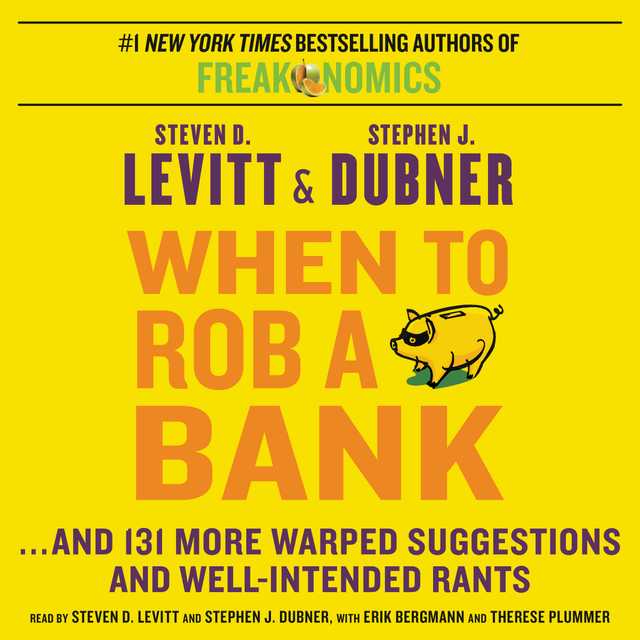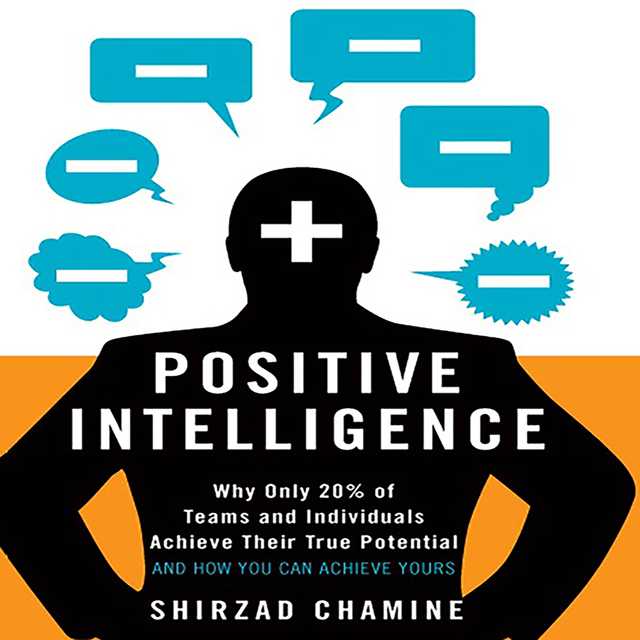When to Rob a Bank Audiobook Summary
In celebration of the 10th anniversary of the landmark book Freakonomics comes this curated collection from the most readable economics blog in the universe. It’s the perfect solution for the millions of readers who love all things Freakonomics. Surprising and erudite, eloquent and witty, When to Rob a Bank demonstrates the brilliance that has made the Freakonomics guys an international sensation, with more than 7 million books sold in 40 languages, and 150 million downloads of their Freakonomics Radio podcast.
When Freakonomics was first published, the authors started a blog–and they’ve kept it up. The writing is more casual, more personal, even more outlandish than in their books. In When to Rob a Bank, they ask a host of typically off-center questions: Why don’t flight attendants get tipped? If you were a terrorist, how would you attack? And why does KFC always run out of fried chicken?
Over the past decade, Steven D. Levitt and Stephen J. Dubner have published more than 8,000 blog posts on the Freakonomics website. Many of them, they freely admit, were rubbish. But now they’ve gone through and picked the best of the best. You’ll discover what people lie about, and why; the best way to cut gun deaths; why it might be time for a sex tax; and, yes, when to rob a bank. (Short answer: never; the ROI is terrible.) You’ll also learn a great deal about Levitt and Dubner’s own quirks and passions, from gambling and golf to backgammon and the abolition of the penny.
Other Top Audiobooks
When to Rob a Bank Audiobook Narrator
Stephen J. Dubner is the narrator of When to Rob a Bank audiobook that was written by Steven D. Levitt
About the Author(s) of When to Rob a Bank
Steven D. Levitt is the author of When to Rob a Bank
More From the Same
- Author : Steven D. Levitt
- SuperFreakonomics
- Freakonomics Rev Ed
- Think Like a Freak
- Publisher : HarperAudio
- Abraham
- American Gods [TV Tie-In]
- Dead Ringer
- House of Sand and Fog
- Prey
When to Rob a Bank Full Details
| Narrator | Stephen J. Dubner |
| Length | 8 hours 13 minutes |
| Author | Steven D. Levitt |
| Category | |
| Publisher | HarperAudio |
| Release date | May 05, 2015 |
| ISBN | 9780062394934 |
Subjects
The publisher of the When to Rob a Bank is HarperAudio. includes the following subjects: The BISAC Subject Code is Business & Economics, Skills
Additional info
The publisher of the When to Rob a Bank is HarperAudio. The imprint is HarperAudio. It is supplied by HarperAudio. The ISBN-13 is 9780062394934.
Global Availability
This book is only available in the United States.
Goodreads Reviews
Jane
July 03, 2015
Levitt should NOT NARRATE. Please have Dubner read all future books. (I listened to the audiobook.)I love Levitt’s brain, but when he talks it’s hard for me to concentrate on what he says. He does not enunciate his words. My mind wanders. I replayed two sentences twice and I still didn’t know what word he was saying. One was “business trips and (compy).” Other examples follow (the correct word is in parentheses): on the rose (roads), the other rection (direction), cloth dipa (diapers), capit (capital), strateg (strategy), camp (campaign), fitty (fitting), verters (virtues).A second problem is Levitt pauses at odd times.But I love Levitt’s thinking and ideas. These guys are a great team.The content of this book can be read for free on the Freakonomics website. It consists of blog posts by the two authors and interactions with readers. I wanted something in audio form so I was happy to buy the book.CONTENT:Many interesting ideas. I enjoyed it.One thing surprised me - regarding sports: There is a home field advantage in soccer games. But it is not the fans influencing the players, it’s the fans influencing the REFS. Apparently, Refs make calls to please the fans. And the closer the fans physically are to the refs, the more calls they make to please the fans. This was noticed in games where there was a running track between the field and the audience. The guys were studying soccer, but this likely applies to other sports.There were several suggestions from former gang members and others about how to reduce gang membership. One gang leader said he loses members when they get jobs. Someone else suggested the cops take a gang member and drop him off alone late at night in the middle of a rival gang’s territory. He’ll get beat up.DATA:Narrative mode: 1st and 3rd person. Unabridged audiobook length: 8 hrs and 13 mins. Swearing language: none, except one chapter used the word bulls*** several times. Sexual content: none. Book copyright: 2015. Genre: nonfiction, economics.
Abyssdancer (Hanging in there!)
February 17, 2022
This book contains blog entries from a website set up by the authors of the “Freakonomics” books … topics range from terrorism to the significance of naming babies, from high gas prices to the reasons for lying … this book was not nearly as substantive as the other three “Freakonomics” books - not all of the blog entries contained peer reviewed empirical data - but I enjoyed reading this book because the omnipresent “Freakonomics” sense of humor was spot on, and I liked the wide range of topics that they covered … the only thing that really threw me when reading this book was that the timelines of when the entries were posted was confusing, so it was hard to put some entries in the proper context … but I chuckled most of the time I was reading it - except for the postings about Steve Levitt’s sister … she died at the age of 50 in 2012 of an aggressive form of cancer, and Levitt included a posting from his father and the eulogy he himself wrote about his sister … tears welled in my eyes as I read the descriptions of how horribly she died but how fondly and lovingly she will be remembered … So I would recommend this book, even if you’re not a “Freakonomics” junkie … as a psychology major, I enjoyed their opinions about human behavior, and the research they did cite was fascinating …
Brian
June 27, 2015
After a certain amount of disappointment caused by the previous Freaknomics inspired book, Think Like a Freak, I was prepared to find the latest equally disappointing. After all, the authors admit this is just a transcription of parts of their blog. In economics terms, as they point out, this is the equivalent of buying bottled water - paying money for something you can get for free. However they do claim to have culled the best from their blog, so you don't have to, which is a useful service.Like the huge successful Freakonomics and its successors, the blog is all about taking the tools of economics and statistics and using them in everyday life. Only here the uses are less thought through. Where they might have done a lot of work to get a piece together for one of the main books, here it's usually just a quick thought, without in-depth research attached. However despite this - and arguably sometimes because of this - a good number of the entries are thought provoking, challenging, fun or all three. You'll find everything from a debate with a number of experts on what you should do with $10 in your pocket when passing a drunken beggar and hotdog stall to an idea to 'fix' the UK health service (apparently David Cameron wasn't impressed) and some surprising considerations on what is and isn't good for the environment. Not to mention why most people get the answer totally wrong to 'why has consumption of shrimp gone up'... and, of course, the title question of the book.Sometimes you do feel that they are just setting out to be provocative without any great reason to be - for example in the items on terrorism. (Though they do underline the important point that most security measures are for show, not to do the job.) Elsewhere, while what they have is an interesting theoretical solution to a problem, it's usually a classic example of economists not understanding psychology. Even though they make several references to behavioural economics, this is mostly classical economics with its undying belief in markets and assumption that we behave as homo economicus. This comes through, for example, in that UK health service 'fix', which is quite logical, but doesn't take any account of the psychology of the British attitude to healthcare free at the point of source.For me, the biggest problem is the sport section, which I pretty much had to skip. Both participants seem obsessed with sport, and specifically with America's very parochial domestic sports, which to anyone outside of the country are likely to be as dull as all the entries on poker will be to non-gamblers. It was also quite sweet that Levitt and Dubner, for all their efforts at putting logic and numbers to the fore, couldn't overcome the US obsession with guns - so in various entries trying to see how it might be possible to reduce deaths and injuries by firearms, there is no mention of what the rest of the world sees as the blindingly obvious - get rid of the guns. Duh.Despite the extremely boring sports bit and the gun-blindness, there is plenty to enjoy, so it really wasn't a problem. And if you get to the end and think 'I need more', you can always head over to the blog and get your fill in an all-you-can-eat Freakobuffet. Excellent!
Chafic
July 29, 2019
No, this doesn't tell you the exact logistical details in how or 'when' to rob a bank.This is just a provocative title that's designed to be eye-grabbing and make my coworkers wonder whether I'm a diabolical criminal in my off-time.While this is just a collection of all the blog posts the duo have shared on their Freakonomics blog, it does provide some interesting insight into the uncanny correlations that exist in the world.But if you're still reading this, the answer to the question you're looking for is never.
Jonathan
January 24, 2019
Well this year has started off extremely slow for me, but I have to say, I'm not surprised. This book was excellent, I love these authors and I love the way they think. Highly recommend!
Zieq
June 24, 2016
Insightful and entertaining as ever! Due to it's chaos organized way of publishing made it an easy read too.
Stewart
September 02, 2018
I wound up liking this better than I expected to. The title is certainly eye-catching. The fact that it was written by the authors of Freakonomics, though, gave me pause. I’ve never read that book, but assumed it to be one of those myriad business books that are published every year. And I’ve also always assumed that economics was a boring subject.But this book still looked kind of interesting. And the blog entries of which it was comprised seemed mercifully short, so I decided to give it a try. I have apparently been wrong about economics all these years, or at least the vision of it contained in this book is actually kind of fun (at this point, I can almost hear the anguished cries of economics students: “No! Flee while you still can!”)The book ranges across a wide array of topics. Samples include: “If Crack Dealers Took Lessons from Walgreen’s, They Really Would Be Rich”,”Why Are Kiwifruits So Cheap?”,”Is the Endangered Species Act Bad for Endangered Species?”,”Loss Aversion in the NFL”,”I’m A High-End Call Girl; Ask Me Anything”,”Shrimponomics”, and more. The book reminds me in some ways of popular science books that reveal the physics behind everyday objects and the like. This book does the same thing, just with economics.I found it to be quite fascinating, actually, and I’m very probably going to be reading their other books at some point. Recommended!
Brittany
April 11, 2017
Love this series Another interesting look at life from these two. I listen to their podcasts, but I didn't realize they had a blog. Fun, thought-provoking reading.
Erik
August 18, 2015
This collection of blog posts from the Freakonomics blog is, page for page, probably the most thought provoking book I think I have ever read! Hilarious, sad, interesting, depressing, disappointing, uplifting, and so on. Amazing, quick book that reads more like a magazine. Highly recommended if you like thinking about how the world works.
Jeff
November 19, 2019
I very much enjoy the work of Levitt and Dubner. This is an accumulation of blog articles from their website, as such its a bit sporadic, but full of many though provoking ideas. While I don't necessarily agree with everything they say, I enjoy reading about their thoughts and the process from which they are able to come to a conclusion.
Amanda
February 19, 2019
Really interesting collection of blogs from the Freakonomics guys. I listened to the audiobook version. I never get sick of their work so I would have listened to this for 100 more hours.
Most Popular Audiobooks
Frequently asked questions
Listening to audiobooks not only easy, it is also very convenient. You can listen to audiobooks on almost every device. From your laptop to your smart phone or even a smart speaker like Apple HomePod or even Alexa. Here’s how you can get started listening to audiobooks.
- 1. Download your favorite audiobook app such as Speechify.
- 2. Sign up for an account.
- 3. Browse the library for the best audiobooks and select the first one for free
- 4. Download the audiobook file to your device
- 5. Open the Speechify audiobook app and select the audiobook you want to listen to.
- 6. Adjust the playback speed and other settings to your preference.
- 7. Press play and enjoy!
While you can listen to the bestsellers on almost any device, and preferences may vary, generally smart phones are offer the most convenience factor. You could be working out, grocery shopping, or even watching your dog in the dog park on a Saturday morning.
However, most audiobook apps work across multiple devices so you can pick up that riveting new Stephen King book you started at the dog park, back on your laptop when you get back home.
Speechify is one of the best apps for audiobooks. The pricing structure is the most competitive in the market and the app is easy to use. It features the best sellers and award winning authors. Listen to your favorite books or discover new ones and listen to real voice actors read to you. Getting started is easy, the first book is free.
Research showcasing the brain health benefits of reading on a regular basis is wide-ranging and undeniable. However, research comparing the benefits of reading vs listening is much more sparse. According to professor of psychology and author Dr. Kristen Willeumier, though, there is good reason to believe that the reading experience provided by audiobooks offers many of the same brain benefits as reading a physical book.
Audiobooks are recordings of books that are read aloud by a professional voice actor. The recordings are typically available for purchase and download in digital formats such as MP3, WMA, or AAC. They can also be streamed from online services like Speechify, Audible, AppleBooks, or Spotify.
You simply download the app onto your smart phone, create your account, and in Speechify, you can choose your first book, from our vast library of best-sellers and classics, to read for free.
Audiobooks, like real books can add up over time. Here’s where you can listen to audiobooks for free. Speechify let’s you read your first best seller for free. Apart from that, we have a vast selection of free audiobooks that you can enjoy. Get the same rich experience no matter if the book was free or not.
It depends. Yes, there are free audiobooks and paid audiobooks. Speechify offers a blend of both!
It varies. The easiest way depends on a few things. The app and service you use, which device, and platform. Speechify is the easiest way to listen to audiobooks. Downloading the app is quick. It is not a large app and does not eat up space on your iPhone or Android device.
Listening to audiobooks on your smart phone, with Speechify, is the easiest way to listen to audiobooks.






























